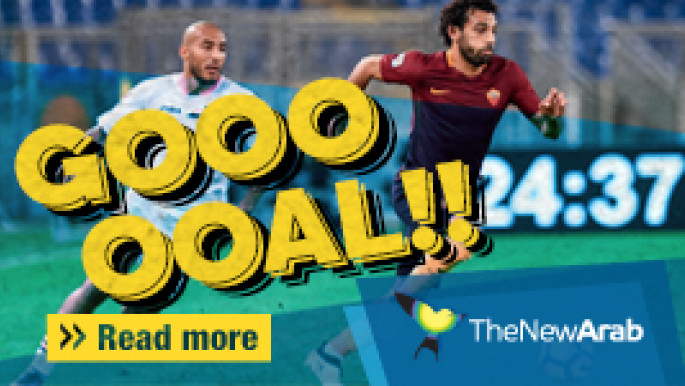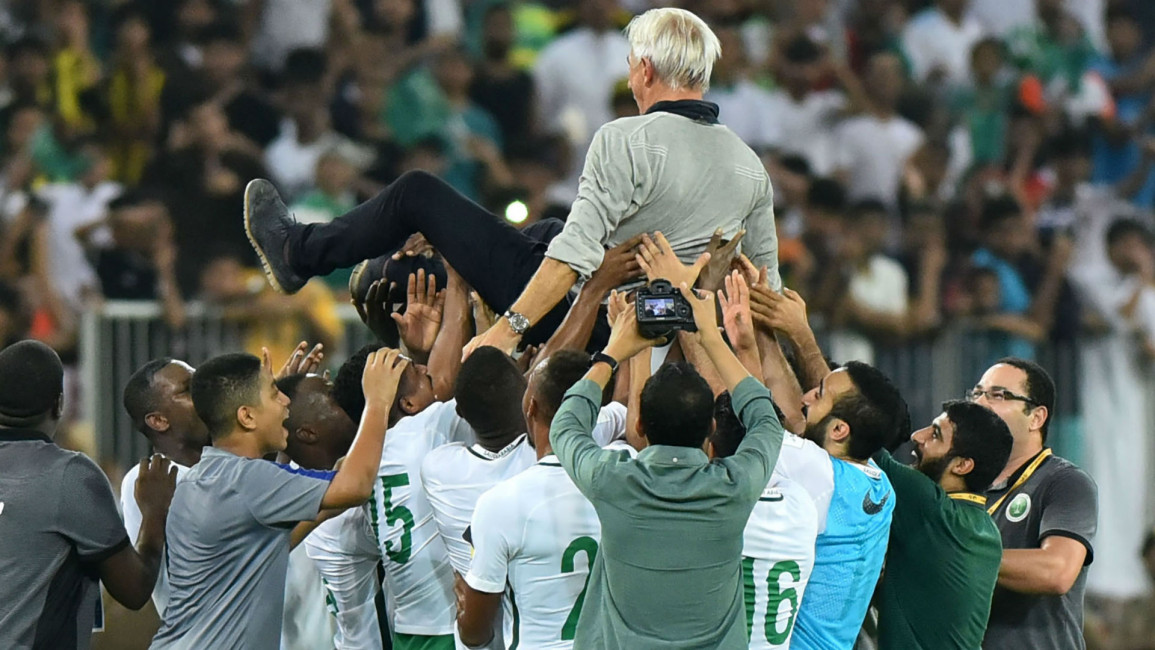
Home ties: This week in Middle East football
Home ties: This week in Middle East football
Despite reaching the World Cup finals, Saudi Arabia's manager, Bert van Marwikj, has been unceremoniously sacked for refusing to relocate to the conservative kingdom, writes Uri Levy.
4 min read
Saudi Arabia sacked their coach shortly after the team qualified for the World Cup [AFP]
A career as a football manager is probably one of the least secure or stable roles in the game. One day you are on top of the world, the other you are forgotten and unemployed. And in the Middle East, where everything seems to be taken to the extreme, the manager's job is always at risk.
Earlier this week, the Saudi FA announced the termination of national team manager Bert van Marwijk's contract - and that of all his crew - despite the Dutch-born coach leading the Saudis all the way to the 2018 World Cup in Russia just a week before.
The reason understood to be behind van Marwijk's dismissal was the coach's refusal to relocate to Saudi Arabia, preferring to stay and live in Holland.
Within 24 hours, the Saudi FA announced the signing of Edgardo Bauza, the former Argentina national team coach who failed to get the former World Cup winners qualified for next year's tournament.
After disgrace in his home country, Bauza became the UAE national team's manager. He stayed for three matches, launching his vision for the UAE's 2019 Asian Cup campaign - where the Emirates will be the host nation - the day before his appointment to Riyadh.
The move faced no public protest or resistance from the Emirates, but has launched a thousand rumours. Was the Bauza deal agreed before the conclusion of van Marwijk's reign? Do wider Gulf geopolitics account for the relationship between the Saudi and UAE football associations?
The two Omars
The Asian Champions League quarter-finals were held last week - with the qualification of Iranian champions, Persepolis, and Saudi champions, Al-Hilal. The competition's semi-finals also form the West Asian regional final.
Earlier this week, the Saudi FA announced the termination of national team manager Bert van Marwijk's contract - and that of all his crew - despite the Dutch-born coach leading the Saudis all the way to the 2018 World Cup in Russia just a week before.
The reason understood to be behind van Marwijk's dismissal was the coach's refusal to relocate to Saudi Arabia, preferring to stay and live in Holland.
Within 24 hours, the Saudi FA announced the signing of Edgardo Bauza, the former Argentina national team coach who failed to get the former World Cup winners qualified for next year's tournament.
After disgrace in his home country, Bauza became the UAE national team's manager. He stayed for three matches, launching his vision for the UAE's 2019 Asian Cup campaign - where the Emirates will be the host nation - the day before his appointment to Riyadh.
Twitter Post
|
The move faced no public protest or resistance from the Emirates, but has launched a thousand rumours. Was the Bauza deal agreed before the conclusion of van Marwijk's reign? Do wider Gulf geopolitics account for the relationship between the Saudi and UAE football associations?
The two Omars
The Asian Champions League quarter-finals were held last week - with the qualification of Iranian champions, Persepolis, and Saudi champions, Al-Hilal. The competition's semi-finals also form the West Asian regional final.
A Saudi-Iranian clash in football is always intriguing, and on such a prestigious stage like the Asian Champions League semis, it's even more exciting - especially given the political tensions between Saudi Arabia and Iran in economic, religious and cultural leadership of the region.
Meanwhile, two of the region's most esteemed players - the two Omars - are back in the spotlight.
Omar "Amoory" Abdulrahman of the UAE's Al-Ain is the biggest star in Middle Eastern football. After finishing fourth in the Arabian Gulf League and losing last year's final to Korean Jeonju last season, Al-Ain had been relying on their star player to carry them to continental glory in tyhe Champions League.
But the big-haired goal-machine showed little of his talent, while his teammates' skill level was also significantly below what's expected from the cream of Asia's superclubs.
With the failure of the UAE national team to qualify for the World Cup in Russia, Amoory - "The Arabian Messi" - is starting to resemble the real Messi with Argentina. There is tons of potential, but the final result just isn't satisfying.
The expectations from Amoory are huge. Along with his teammates' contributions and the pressure on his tiny shoulders it's a real possibility that he could fail to fulfil his full potential and become the biggest global Arab soccer star, as everyone has long predicted.
Moreover, after Al-Ain's elimination from the Champions League, fans have even started to discuss whether he should have gone to play in Europe this summer when he had the offers, instead of struggling with Al-Ain on the local Emirati scene.
As for Omar al-Somah, Al-Ahli Jeddah's Syrian star, things are a bit different.
 |
|
The best striker in Asian football for the past three seasons did live up to expectations in the Syrian national team two weeks ago - scoring an historic equaliser against Iran in Tehran.
But in the second leg of Al-Ahli versus Persepolis he disappeared in the final moments, to watch rival striker Mehdi Taremi hammering the final nail into the Saudi coffin, and sending Persepolis to the semi-final.
It won't be the final sight of al-Somah in Asian football's top competition, but it came as a huge blow after years full of achievements and successes.
Twitter Post
|
Will the Champions League departure of two giants from this Middle East footballing generation affect their careers? For sure. But for better or worse? Only time will tell how they deal with their failures.
Mama Africa
Africa's Champions League quarter-finals also got underway this weekend, to great fanfare from fans, media and clubs themselves.
The dominance of the North African teams in the knockout stage is massive. Six of the eight clubs in the competition are from North Africa - Egypt, Tunisia, Algeria, Morocco and Libya. At least two Arab representatives will be featured in the tournament's semi-finals.
Unfortunately, except for the match between Egypt's Al-Ahly and Tunisia's Taraji - a serious 2-2 thriller in Alexandria's Borg El-Arab stadium - most of the games were not at the professional level expected at this stage of the competition.
On Sunday, Borg El-Arab also hosted the tournament's Cinderella - Al-Ahli Tripoli - that is holding its matches in a neighbouring country due to the security situation in Libya. The Libyans, who previously knocked out the Zamalek giants, finished their match against Etoile du Sahel from Tunisia in a goalless draw.
Other results: Mamelodi Sundowns-Wydad Casablanca 1-0; Ferroviário Beira-USM Alger 1-1.
Uri Levy runs the popular football blog BabaGol, which covers football and politics focusing on the Middle East. Follow him on Twitter, and read his blog here.




